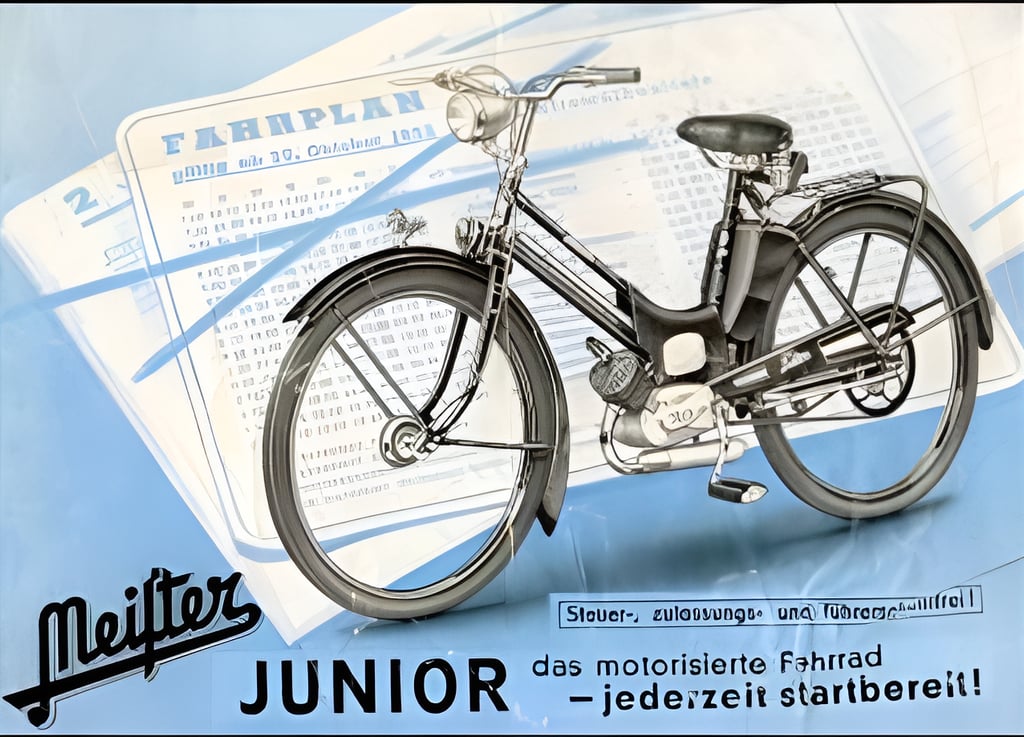The Legacy of Meister: From Bicycles to Mopeds
The article discusses the history and legacy of the German two-wheeler manufacturer Meister, which transitioned from bicycle production to the manufacture of mopeds and motorcycles in the mid-20th century.
GERMANY TWO STROKE1950'SVINTAGE MOPEDSMEISTER
8/24/20242 min read


The Legacy of Meister: From Bicycles to Mopeds
Meister, officially known as Meister Fahrradwerke (Meister Bicycle Works), was a notable German manufacturer with a significant history in the realm of two-wheeled transportation. The company's evolution from a modest bicycle maker to a prominent player in the moped and motorcycle industry exemplifies its adaptability and innovation during the mid-20th century.
Origins and Early Years
While the precise founding date of Meister remains unclear, it is evident that the company was well-established as a bicycle manufacturer by the mid-20th century. Based in Bielefeld, Germany, Meister was part of a flourishing industry that witnessed numerous bicycle manufacturers transitioning into motorized two-wheeler production in the aftermath of World War II.
Transition to Motorized Vehicles
Meister's foray into the motorized vehicle sector began in 1949, marking a pivotal shift in the company's focus. This transition was part of a broader trend in post-war Germany, where many bicycle manufacturers sought to meet the increasing demand for affordable personal transportation by producing motorized vehicles.
Diverse Product Range
Meister quickly expanded its product line, offering a variety of motorized two-wheelers:
Motorcycles: The company manufactured motorcycles utilizing engines from reputable suppliers such as Sachs and ILO. These engines, known for their reliability and performance, enabled Meister to establish a foothold in the motorcycle market.
Mopeds: Meister gained particular recognition for its moped production. Models like the Meister Junior became popular for their practicality and affordability.
Cycle-attachment engines: In the early 1950s, Meister explored the production of cycle-attachment engines, such as the Küchen 'help-engine', which could be fitted to standard bicycles to provide motorized assistance.
Notable Models
Among Meister's notable productions are:
M59J 175cc: Powered by a JLO engine, this model was introduced in 1951.
Meister Roller: Launched in 1955, this moped model became a focal point of the company's offerings.
Collaboration and Innovation
Meister's history is characterized by collaboration and innovation. The company often worked with other manufacturers, producing vehicles that were sold under different brand names with minor modifications. This practice was common in the industry and allowed for a broader market reach.
Later Years and Legacy
While specific details regarding Meister's later years and eventual fate are limited, the company's influence on the German moped and motorcycle industry is undeniable. The 1955 Meister Roller moped, in particular, stands as a testament to the company's ability to produce vehicles that catered to the needs of post-war European consumers seeking efficient and affordable transportation.
Meister's legacy endures through the vintage motorcycles and mopeds that remain today, each serving as a rolling piece of history that reflects the ingenuity and craftsmanship of this once-prominent German manufacturer.
